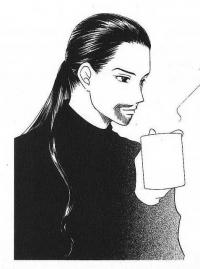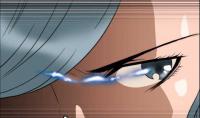I said there were so many examples I could write an essay. Looks like I can't hold it in, so here it comes:
I've been saying this often lately, it seems. The more I read 'em, the more I feel like it's true. Many Korean webtoons are a cry for a kinder, gentler society that values the individual and creativity, but also mutual help and fellow feeling, against a society seen as harsh, regimented and controlling, where business trumps human needs and status trumps common humanity.
"Today's Department of Sentimentality" may be the most obvious case. That's what it's explicitly about: An ordinary nerd getting sucked into the attempts of an impractical, rebellious dreamer to carve out a place for sentiment and dreaming amid the relentless focus on money and status that drives a modern Korean univiersity. Universities, places of youth and of education, have traditionally been sites of rebellion and creative energy, and it seems a particular indictment of modern society that even the university has become a place of dogged insistence on pure efficiency and the bottom line, with everyone living such precarious lives that their focus is reduced almost entirely to what will drive their future prospects of earning a living, at the expense of their personal needs and desires.
But many others have similar messages, either blatantly obvious or quieter. "Annarasumanara" is, again, pretty blatant. The main character is intelligent and virtuous, but struggling due to poverty, and as the story begins has already smothered her own dreams due to the pain of realizing she can never have them. She subordinates everything to survival for her and her sister, which requires conforming to what society wants from her. She is a top student, but because of her lower social class does not get the respect of her male counterpart from a wealthy and respected family. Yet his dreams are also smothered by his family's expectations of success, so systematically that at first he does not even seem to have any dreams of his own, and ridicules and resents the idea that anyone could. It takes the entry of magic into the story, literally a source of colour in a black and white world, to begin to reawaken their sense of wonder, of personal aspirations and creativity.
Even in webtoons that don't overtly criticize society, that don't seem to have a political aspect, it is nonetheless often there. "Nineteen, Twenty One" is, on the surface, a romance, and much of the time is spent on the innocuous act of helping stray cats. The frame around the stray cats, though, is the same set of social issues. The characters see the cats as beautiful, individuals with their own needs and desires, trying to make their way in the world. Society's response is to consider them worthless, pests, mere objects and ones which do not fit into the efficient workings of the machine. People buy into this, revile them and treat them badly. The campaign to save and help the cats becomes a small rebellion. Part of the response is, e.g. through neutering, to try to make the cats more acceptable to society, less of a nuisance. But another part involves persuading people of the cats' inherent worth, of trying to get society to allow a space for these individuals that do not fit. And the people who work on this do it in a relatively egalitarian way, supporting each other, putting in a great deal of work on a project they know is impractical in society's terms, giving them no advantage and indeed costing them. They are in a way forming a tiny micro-society of mutual support rather than harsh pecking order, and of idealism rather than instrumental selfishness. We see much the same kind of message in "Pet Diary", which is all about the cultivation of our humanity through caring for animals.
Vampire stories have been used for a lot of different purposes. “Orange Marmalade” uses the vampire as an oppressed minority. The main character hides and represses her true self, living in fear of being reviled for who she is by a society which hates the outsider and crushes those who do not fit in. Her self-expression seems only to come out in her music, which she normally plays only in front of people who don’t know her. But the story is not only about her. While people taken as large groups, consuming media, show their hostility and fear, individual friends reject their xenophobia, and embrace and support her as a person.
“Song of the Cloud” also focuses on music—it is after all about musicians. But even there, it is specifically about misfit musicians, ones with problems who choose to follow where the music leads them. Where both manhwa and Japanese manga about musicians tend to follow the careers of idols, pushing to give more and more impressive performances and climb the ladder of the big-money media world, “Song of the Cloud” strongly contrasts the main characters with that sort of corporate-groomed show business. When the band enters a contest, the fix is in: An idol group in a corporate stable has been set up to win. The main characters only got in, in fact, because they happened to send in a crappy demo tape—the contest sponsors were only letting in poor bands so as to show off the idol group to advantage against their incompetence. Meanwhile, the judges mainly knew who they had to vote for and the media were lined up. The corruption was so overt that one of the idol group members, who had ambitions to do good music, walked out and in the end joined the protagonists. Meanwhile, spontaneous internet buzz to some extent gained the band what the corporate music industry was denying them. At a personal level, the musicians are all different but all with problems, in some cases barely sane by the standards of society. In one way or another they reject social norms, strata, oppressive etiquette; in pain, they start to find support in each other. I’d say the rebellion against corporatism, against the cult of efficiency, and for a certain caring creativity is pretty plain there.
“Welcome to Room #305” seems to have been specifically conceived as a vehicle to combat homophobia. I haven’t read too much of it, so I can’t comment much on the directions it took, but I seriously doubt it cuts against my argument.
“Girls of the Wild’s” would seem a pretty unlikely source of social commentary. The main character surrounded by beautiful girls who are top-level martial artists in a highly unlikely school, the female lead amazingly wealthy, it seems like some kind of shounen harem manga . . . but in fact it deals with class issues, wealth, poverty and greed, and concentrates heavily on bullying and its social acceptance. The main character is poor, has had a life of squalor and privation supporting his quite young siblings while going to school, with no social supports, and his identity as a poor boy who has to work while he goes to school seems to have been one motivation for the extensive bullying he suffered, hence the bullies’ nickname for him, “Worker Song”. The female lead has been isolated by her wealth, dogged by (often accurate) suspicion that people coming close to her are interested in her money, but her incomprehension of the hero’s problems only underlines the privation he has to deal with. The girls are amazing fighters, and “put their lives on the line” in the ring, but while exciting it seems oddly artificial next to his struggles for day to day survival. He is gaining a better life because of this peculiar school he attends now and the remarkable girls in it . . . but I find myself realizing uneasily from time to time just how unlikely that is, and what a terrible situation he would be in without their deus-ex-machina interventions helping to break the cycle he has been trapped in.
Overall, I get the feeling that the Korean webtoon community sees itself somewhat like the protagonists of “Song of the Cloud”—misfit individuals struggling to find a place to express their creativity and help one another in a society that seems dedicated to stifling it in the name of efficiency, commercial success, and a regimented pecking order where those who fail to fit and be useful to the system are crushed. While their fiction invokes an individualist response in a way, it’s also one where mutual help becomes a rebellion against a situation where people are only supposed to help the system rather than each other, where people are divided against each other by place on pecking order, xenophobia, or competition so that, alone, they can only submit to the demands of commercial society. The corporate society is a paradox—individualist in pitting people against each other, it nonetheless stifles everything that makes people individual, crushing their desires and creativity, making them alone but interchangeable, parts to be used. In the webtoon reaction this is inverted. People’s individual differences and creativity, which make them not interchangeable but unique, are to be celebrated, and it is this that allows their acceptance of each other’s common humanity, so that they can support and gain strength from each other rather than being divided against each other. The specifics may relate to the particularly harsh nature of Korean society, but the conditions really apply to the whole globalization-ridden world, dominated as it is by an increasingly rigid and hierarchical corporate outlook. I see parallels with the Romantic poetry of 18th-19th century England, which was a rebellion against social regimentation, the horrific conditions created by the industrial revolution, and a rationalist approach that treated these evils as necessary.

Korean webtoons as countercultural rebellion
Started by Purple Library Guy, Apr 27 2012 09:24 PM
#1

 Posted 27 April 2012 - 09:24 PM
Posted 27 April 2012 - 09:24 PM

#2

 Posted 28 April 2012 - 08:29 PM
Posted 28 April 2012 - 08:29 PM

It's a good point, also Zebra is along the same lines(so far), and there's a number of others that fall into the same catagory.

#3

 Posted 05 May 2012 - 06:23 PM
Posted 05 May 2012 - 06:23 PM

Great new chapter, the plot and characters have started to develop a lot more over the last few chapters.

#4

 Posted 06 May 2012 - 02:18 AM
Posted 06 May 2012 - 02:18 AM

I think I feel sorry for that Japanese guy. I mean, he just wants to swot that placement exam thing, and being foreign he missed the pun and thinks that's what this club is really for. Funny! But, poor sod, he has enough problems just studying in a place where he barely knows the language.
I love the thought bubble with Soo Ri as the ultimate weapon.
I love the thought bubble with Soo Ri as the ultimate weapon.

 Sign In
Sign In Create Account
Create Account




 Back to top
Back to top









